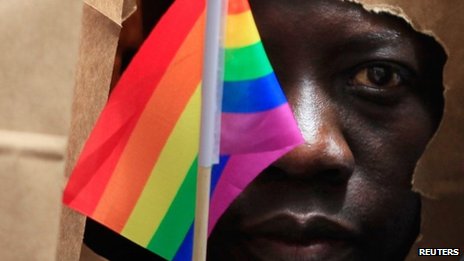Despite advances towards equality and human rights, there remains a blight on society caused by outdated beliefs. Ranging from a UKIP councillor with a bizarre claim that same sex marriage is causing floods, to the proposed laws in Uganda that can lead to the death penalty. It all highlights a very worrying opinion and an increase of homophobia that restricts people’s rights and their right to love.
Uganda
Currently, Amnesty international claims that ‘it is illegal to be gay in 34 out of 54 African states’, within which there are five countries who implement the death penalty as a punishment for homosexuality. Despite the advances made for Gay rights in the continent, there remains a worrying amount of anti-gay sentiment in Africa and this is especially the case in Uganda. Originally, it was legal to admit to being gay but not to act upon it; the result of doing so was a seven-year jail term. However, this stance is now believed to be too liberal and is set to change as a result of press driven homophobia. A private members bill is being pushed through parliament that doles out far harsher penalties for homosexual activities. The first instance of the bill set out that the death penalty would be used if an individual committed a homosexual act with a minor or was HIV positive but this was later removed. As it stands now, the bill states that a homosexual relationship should be punished by means of life imprisonment, further it will become a crime not to report a homosexual person. Uganda’s president has used his veto against it but still publicises his view that gay people are sick and need curing through economic prosperity. Despite the veto, the bill may remain and be passed by parliament as long as there is a two-thirds majority for it. President Museveni is trying to negotiate changes to the severity of the bill to limit the damage it could wreak. Worryingly, it seems anti-gay sentiment cannot be halted despite international pressure and the withdrawal of aid and this could have devastating consequences for people similar to those of Cameroon’s Roger Jean-Claude Mbede.
Cameroonian Jean-Claude Mbede was imprisoned for three years for texting another man that he loved him; he was beaten, sexually assaulted and refused medical treatment in prison, all because of his sexual orientation. His case highlights the problems faced by LGBT communities in Africa. Amnesty took up his case as a prisoner of conscience and supported him in place of the friends and family he lost because of state supported homophobia. Amnesty has asked for e-mails to be sent to the Ugandan president to try to stop this bill from passing and preventing the country’s homophobia from intensifying. It is a small contribution but it helps to show the international reaction to the bill and highlight how it takes away fundamental human rights. https://www.amnesty.org.uk/actions/stop-uganda-anti-homosexuality-bill
UK
Recently the British government passed laws allowing for gay marriage in England and Wales, a positive change after previous years of inequality. The move signals another step towards sexual equality in the country. Despite this apparent improvement in attitudes to gay rights it seems there subsists, in the key pillars of society, an anti-gay sentiment that is holding the country and LGBT communities from achieving total equality. This is highlighted by UKIP Councillor David Silvester’s barmy comments regarding gay marriage in his letter to David Cameron from two years ago. Silvester, in the scandal that became public knowledge this week, blamed Cameron’s gay marriage laws for the flooding that blighted Britain over the Christmas period ‘It is his fault that large swathes of the nation have been afflicted by storms and floods’. He was subsequently told by UKIP to stop airing his views under the party name but continued to do so regardless in an interview with Radio Berkshire on Sunday and was consequently suspended. Even in a liberal country like Britain, there remains an underlying opposition to the LGBT community at the highest levels, a fact that was further shown by the conservatives dwindling numbers after passing the marriage bill. Despite advances towards equal rights, rejection of homosexuality remains a very political issue with many people prepared to follow the hard-line approach.
Russia
Vladimir Putin, on Monday the 20th, rejected claims that he was homophobic, despite his actions suggesting otherwise. During an interview with Andrew Marr, he claimed to have gay friends and to liking Elton John’s music. There has been much publicity over Russia’s anti-gay propaganda laws, especially in light of the winter Olympics being hosted in Sochi. The laws ban the use of propaganda to promote homosexuality or Paedophilia, a move that has been seen as an attack on people’s rights and freedom of speech. Openly gay athletes fear persecution from the country’s citizens but equally desire to compete in the games that they have trained for four years to compete in. Putin, in making the admission that he is no homophobe, is simply trying to play the threat down, explaining his ban on ‘homosexual propaganda’ as a solution to the country’s low birth rate but in actual fact is simply trying to ensure the games, which will be prosperous for Russia, are not disrupted.
The three examples have shown a worrying growth in Homophobia, especially within Africa. Despite calls for more equality, there is a growing discrimination against the LGBT community and not enough is being done to combat this. For example, the calls for a boycott on the winter Olympics has been disregarded as Russia finds ways to change its public image. Also the prospect of ruining many years of training to boycott an event that still allows countries with a similar attitude to Russia competing seems hypocritical and pointless to many. It seems that there is still a long way to go to change the attitudes of people to become more understanding and accept that love is love.

